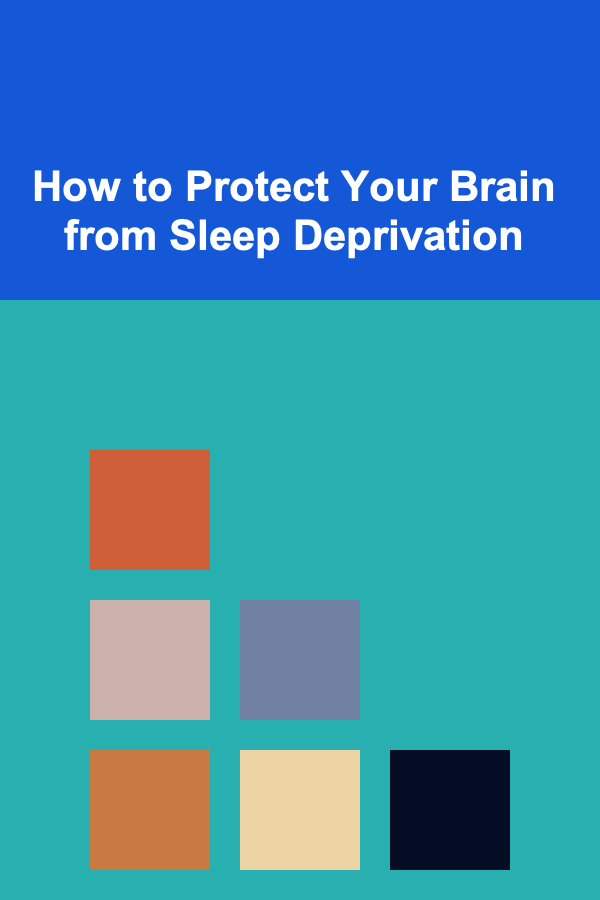
How to Protect Your Brain from Sleep Deprivation
ebook include PDF & Audio bundle (Micro Guide)
$12.99$6.99
Limited Time Offer! Order within the next:

Sleep is one of the most essential functions for the human body, influencing almost every aspect of our physical and mental well-being. Among its many roles, sleep is particularly crucial for brain health, ensuring proper cognitive function, emotional stability, and memory retention. However, sleep deprivation is a common problem in today's fast-paced society, often leading to significant cognitive impairments and long-term consequences. In this article, we will explore the impact of sleep deprivation on the brain and provide actionable strategies on how to protect and restore cognitive function in the face of insufficient sleep.
The Science Behind Sleep and the Brain
The Importance of Sleep for Brain Function
Sleep serves several key functions in maintaining brain health. During sleep, the brain performs a variety of essential tasks, such as consolidating memories, regulating emotions, and removing waste products. Sleep is divided into two main phases: Non-rapid eye movement (NREM) sleep and rapid eye movement (REM) sleep. Both phases are critical for different cognitive functions:
-
NREM Sleep:
- Stage 1: A light sleep stage where the body begins to relax.
- Stage 2: A deeper sleep phase that helps with memory consolidation and the maintenance of cognitive functions.
- Stage 3: Known as deep sleep or slow-wave sleep (SWS), this stage plays a critical role in physical restoration, immune function, and the brain's ability to consolidate new information.
-
REM Sleep:
- This stage is where most dreaming occurs. REM sleep is crucial for emotional regulation, creativity, and learning. It helps integrate emotional experiences and facilitates cognitive flexibility.
During sleep, the brain also clears waste products, including beta-amyloid plaques, which are associated with Alzheimer's disease. This process, known as the glymphatic system, is essential for maintaining long-term brain health and function.
Effects of Sleep Deprivation on the Brain
Sleep deprivation occurs when an individual does not receive enough sleep, either in quality or quantity, to meet the brain's needs. Even short-term sleep deprivation can have a substantial impact on cognitive performance and mental health. Chronic sleep deprivation, however, can lead to more serious and long-term consequences.
Short-Term Effects of Sleep Deprivation
- Cognitive Impairment: Lack of sleep negatively affects attention, problem-solving, and memory consolidation. Sleep-deprived individuals often experience difficulty concentrating, making decisions, and retaining new information.
- Mood Disturbances: Sleep deprivation is closely linked to irritability, anxiety, and increased emotional reactivity. The brain's emotional regulation system becomes impaired, leading to mood swings and a heightened stress response.
- Reduced Motor Skills and Coordination: Sleep-deprived individuals may struggle with fine motor coordination, increasing the risk of accidents and injuries. This occurs because sleep plays a vital role in maintaining motor functions and reaction times.
Long-Term Effects of Sleep Deprivation
- Cognitive Decline: Chronic sleep deprivation accelerates cognitive decline and can contribute to the development of neurodegenerative diseases like Alzheimer's and Parkinson's. The accumulation of beta-amyloid plaques during sleep deprivation is one of the key factors in these diseases.
- Mental Health Disorders: Sleep deprivation is a significant risk factor for the development of mental health issues such as depression, anxiety disorders, and psychosis. Insufficient sleep can lead to dysregulated mood and an inability to cope with stress effectively.
- Impaired Immune System: Long-term sleep deprivation weakens the immune system, making the brain more susceptible to infections and inflammation. Chronic inflammation in the brain is also linked to neurological diseases and conditions like stroke and dementia.
- Increased Risk of Stroke and Heart Disease: Sleep deprivation is associated with an increased risk of developing cardiovascular diseases, including stroke and high blood pressure. This is primarily due to its effects on the body's ability to regulate the autonomic nervous system and maintain healthy blood pressure levels.
Why the Brain Needs Sleep to Heal
The brain is an incredibly energy-demanding organ, consuming about 20% of the body's total energy at rest. During sleep, the brain engages in restorative processes that help to replenish its energy stores. Sleep also provides the brain with the opportunity to repair damaged cells and synapses, improve neural connections, and strengthen the immune system.
Importantly, sleep also allows the brain to remove toxic waste products that accumulate during wakefulness. Without sufficient sleep, these waste products can build up, potentially leading to neurological damage and the development of diseases like Alzheimer's. This is why maintaining a regular sleep schedule and prioritizing sleep is crucial for brain health.
Strategies to Protect Your Brain from Sleep Deprivation
While sleep deprivation is unavoidable at times due to external factors or lifestyle choices, there are several strategies that can help mitigate its effects and protect the brain. Here are some actionable tips for safeguarding your brain from the damaging consequences of insufficient sleep.
1. Prioritize Sleep Hygiene
Sleep hygiene refers to habits and practices that promote good sleep quality and duration. Establishing a consistent sleep routine can help regulate your sleep-wake cycle, making it easier to fall asleep and stay asleep. Here are some key sleep hygiene tips:
- Maintain a Consistent Sleep Schedule: Try to go to bed and wake up at the same time every day, even on weekends. Consistency helps regulate the body's internal clock (circadian rhythm), making it easier to fall asleep and wake up naturally.
- Create a Relaxing Bedtime Routine: Engage in relaxing activities before bed, such as reading, meditating, or taking a warm bath. Avoid stimulating activities like watching TV or checking your phone, as the blue light emitted from screens can interfere with melatonin production and delay sleep onset.
- Optimize Your Sleep Environment: Make your bedroom conducive to sleep by ensuring it is cool, dark, and quiet. Invest in a comfortable mattress and pillows that support your preferred sleep position.
- Limit Caffeine and Alcohol: Both caffeine and alcohol can disrupt sleep. Avoid consuming these substances in the hours leading up to bedtime. Caffeine, in particular, can stay in the system for hours and interfere with sleep quality.
2. Take Naps Wisely
Short naps can help combat sleep deprivation and boost alertness, but they must be taken correctly to be effective. Here are some guidelines for taking a nap:
- Limit Nap Duration: Aim for a 10-20 minute nap, as this duration is enough to provide a quick energy boost without making you feel groggy afterward.
- Time Your Naps Wisely: The best time to nap is usually in the early afternoon (1-3 PM). Avoid napping too late in the day, as it may interfere with your ability to fall asleep at night.
- Nap in a Calm Environment: Choose a quiet, dark space to nap, as a calm environment will promote deeper sleep.
3. Practice Stress Management
Chronic stress is a significant barrier to good sleep, as it activates the body's fight-or-flight response and increases cortisol levels, making it difficult to relax. Effective stress management techniques can help promote better sleep quality and protect brain health.
- Mindfulness Meditation: Practices like mindfulness and deep-breathing exercises can help reduce stress and anxiety, promoting relaxation and sleep.
- Exercise Regularly: Regular physical activity, especially aerobic exercises like walking, running, or cycling, can reduce stress and improve sleep quality. However, avoid vigorous exercise too close to bedtime, as it may have the opposite effect.
- Journaling: Writing down thoughts and worries before bed can help clear your mind and reduce anxiety, making it easier to fall asleep.
4. Nutrition and Brain Health
What you eat can also influence sleep quality and brain function. A balanced diet rich in nutrients supports brain health and can help mitigate the effects of sleep deprivation.
- Eat a Balanced Diet: Focus on consuming a variety of nutrient-dense foods, including fruits, vegetables, whole grains, lean proteins, and healthy fats. A well-rounded diet supports overall health and provides the brain with the nutrients it needs to function optimally.
- Avoid Heavy Meals Before Bed: Eating large or rich meals right before bed can cause discomfort and disrupt sleep. Opt for light, easily digestible snacks if you're hungry before sleep.
- Support Sleep with Specific Nutrients: Certain nutrients can support sleep and brain health. Magnesium, for example, helps regulate sleep cycles, while omega-3 fatty acids are crucial for cognitive function and neuroprotection.
5. Seek Professional Help if Necessary
If you struggle with chronic sleep deprivation or suspect that you may have a sleep disorder, it's essential to seek professional help. Conditions like insomnia, sleep apnea, and restless leg syndrome can interfere with sleep quality and lead to long-term cognitive impairment if left untreated.
- Cognitive Behavioral Therapy for Insomnia (CBT-I): This evidence-based therapy can help individuals with insomnia develop healthy sleep habits and address the underlying causes of their sleep disturbances.
- Consult a Sleep Specialist: If sleep deprivation persists or you experience symptoms of sleep disorders, a sleep specialist can conduct assessments and recommend personalized treatment options.
Conclusion
Sleep is not just a luxury; it is a fundamental pillar of brain health and overall well-being. Sleep deprivation takes a significant toll on cognitive function, mood regulation, and long-term brain health. However, by prioritizing sleep hygiene, managing stress, eating a balanced diet, and seeking professional help when needed, individuals can protect their brains from the detrimental effects of sleep deprivation. Taking steps to improve sleep quality and ensuring adequate rest will allow the brain to function at its best, supporting both cognitive performance and emotional resilience.

How to Avoid Common Forex Trading Mistakes and Improve Your Profits
Read More
How to Control Pet Fleas and Ticks in Your Home
Read More
How to Help Your Pet Cope with Loud Noises or Fireworks
Read More
How to Organize Your Digital Devices and Save Space at Home
Read More
How to Use Social Media to Grow Your Online Store Business
Read More
How to Create a Pet-Friendly Emergency Preparedness Kit
Read MoreOther Products

How to Avoid Common Forex Trading Mistakes and Improve Your Profits
Read More
How to Control Pet Fleas and Ticks in Your Home
Read More
How to Help Your Pet Cope with Loud Noises or Fireworks
Read More
How to Organize Your Digital Devices and Save Space at Home
Read More
How to Use Social Media to Grow Your Online Store Business
Read More